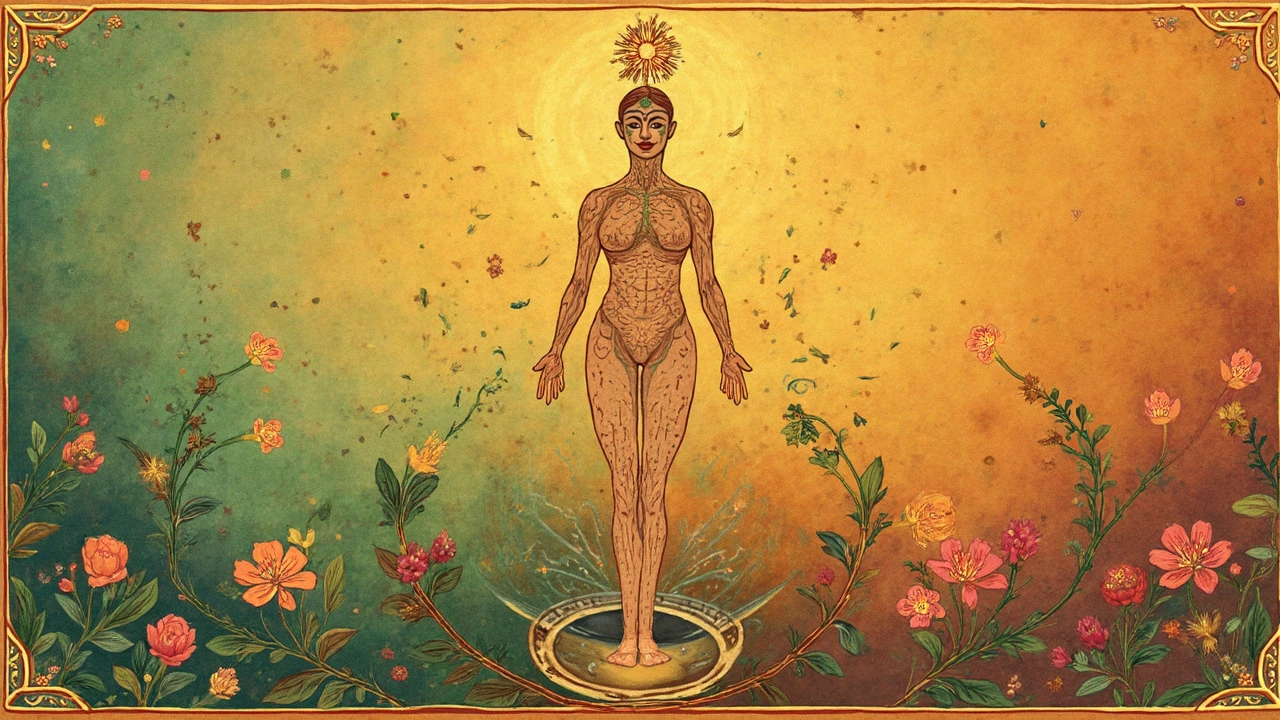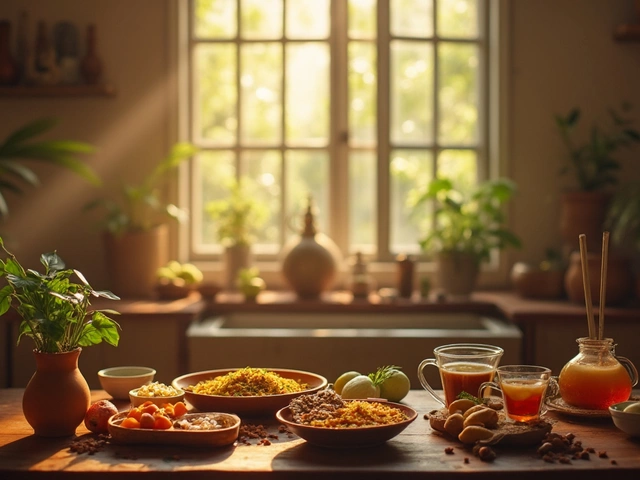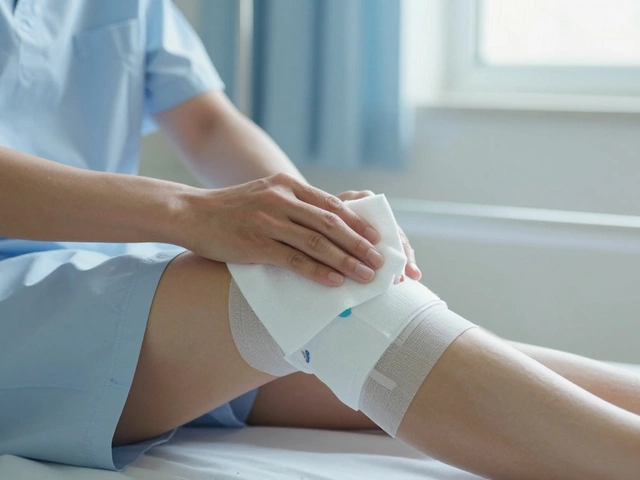Ever felt guilty about sipping your morning coffee when you're also on Ayurvedic meds? You're not alone. Coffee is woven into our routines, but the clash with Ayurveda isn't just hype—it's a real thing for many people.
Here’s the deal: Ayurveda thinks about the body in terms of balance, and coffee is anything but neutral. Coffee amps up your nerves, speeds your heart, and can dry you out—while a lot of Ayurvedic remedies are supposed to calm, cool, or moisten you. If you've wondered if these two can peacefully coexist in your daily life, let’s get straight to the facts and what it means for your health.
The short answer? It really depends on which herbs you're taking, your body type, and how sensitive you are to caffeine. Some combos can cancel out the benefits of your herbal routine or even make side effects worse. But there are also ways to have your coffee and medicine—if you're smart about it. Let's break down the real answers to keep your health on track without giving up everything you love.
- Why Coffee and Ayurveda Mix Like Oil and Water
- The Ayurveda View on Coffee and Caffeine
- What Happens if You Mix Coffee and Ayurvedic Medicines
- When Coffee Is a Hard No with Herbs
- Tips to Make Both Work (If You Really Can’t Give Up Coffee)
- Common Myths About Coffee and Ayurveda
Why Coffee and Ayurveda Mix Like Oil and Water
If you ask any seasoned Ayurveda practitioner about coffee, you’ll probably get a wince. There’s a reason for that. Ayurveda is all about keeping your body’s balance, or doshas, in check. Coffee, which is packed with caffeine, is a stimulant that can seriously shake up that balance.
It’s not just the caffeine kick, either. Coffee is known to heat up the "pitta" dosha (think: fire and water elements), which can already be pretty high in folks who get irritable, overheat, or have sensitive digestion. And if you feel anxious or jittery after coffee, that’s your "vata" dosha (air and space) getting spun around. Both these effects clash directly with what Ayurvedic medicine tries to do—restore calm and stability.
Another problem? Coffee is a natural diuretic. This means that while you’re enjoying the buzz, your body might be losing fluids and getting dehydrated. Many herbal remedies in Ayurveda need a well-hydrated system to work properly—otherwise, you won’t absorb them right or could miss out on the benefits.
There’s also the taste factor. Ayurvedic medicine leans on six tastes: sweet, sour, salty, bitter, pungent, and astringent. Coffee is bitter and pungent, both of which can further unbalance pitta and vata types. So if you already run hot or anxious, coffee just throws more fuel on the fire.
Long story short: coffee’s effects on nerves, digestion, and hydration run against the gentle, harmonizing goals of Ayurveda. That’s why folks in the know say combining the two is like trying to mix oil and water. They just don’t gel without some serious thought.
The Ayurveda View on Coffee and Caffeine
Ayurveda comes with its own style of looking at drinks like coffee. In this ancient system, drinks and foods are sorted by how they affect your body’s doshas—Vata, Pitta, and Kapha. Coffee, with all its buzz, is seen as heating and stimulating. That means it’ll ramp up your Vata and Pitta doshas. If you already struggle with anxiety, restlessness, or heartburn, coffee may push things over the edge.
Let’s get specific: A person with a strong Vata tendency (think dry skin, fidgety, often cold) may feel even more jittery or restless after coffee. Folks with Pitta (prone to anger, heat, acidity) can get more irritable or notice more digestive upsets from their daily cup. For those mainly Kapha (easygoing, sometimes sluggish), a little coffee doesn’t rock the boat as much, because it can offer a mild energy boost.
Ayurvedic texts don’t mention coffee directly. Coffee beans only started making waves in India a few hundred years ago, so you won’t find advice about lattes or espressos in ancient books. But they’re clear about foods that heat and excite the body—like spicy or bitter things—which work a lot like coffee in the system.
Another thing that matters: Ayurveda classifies caffeine as rajasic, which basically means it brings movement, speed, restlessness. Yes, caffeine ramps up thinking and alertness, but too much rajasic stuff brings stress, poor sleep, and even burnout.
Here’s a quick rundown of why Ayurveda is so on-the-fence about coffee:
- It can dry out or overheat the body (bad news for Vata and Pitta types).
- It’s addictive and can mess up your body’s natural rhythms.
- It can block subtle benefits of herbal medicines by speeding up elimination or causing the body to react too fast.
But if you really need your fix of Ayurvedic medicine and coffee, timing is everything. Ayurveda says don’t mix stimulating drinks with medicinal herbs, especially if you want their full benefit. Leave a gap—usually an hour or two—between taking any herbal remedy and drinking your coffee. This helps your body actually absorb what it needs, instead of getting bounced around by caffeine.
What Happens if You Mix Coffee and Ayurvedic Medicines
If you take Ayurvedic medicines and down them with coffee, you’re basically putting your body through a tug-of-war. Here’s why: coffee isn’t just a drink—it’s a powerful stimulant with caffeine that can mess with how herbs are absorbed and how they work in your body. Ayurveda is big on natural healing and works best when your system is calm and balanced—caffeine pushes in the opposite direction.
Some Ayurvedic medicines are supposed to calm nerves or improve digestion. Coffee can do the exact opposite by raising your heart rate, making you jittery, or upsetting your stomach. That’s not the only problem. Caffeine can speed up your metabolism, which might force some herbs out of your system before they've had time to actually help. If you're using herbs to chill out, help you sleep, or lower blood pressure, mixing them with coffee is asking for trouble.
Certain herbs and formulas (like Ashwagandha, Brahmi, or herbal oils for calming the mind) just don’t play nice with Ayurvedic medicine when you add caffeine to the mix. The benefits can get blocked, or you might feel side effects like headaches, anxiety, or restlessness. This is extra true if you’re sensitive to caffeine or have a Vata-based constitution, which is already prone to nervousness and trouble sleeping.
Want to avoid these problems? Here’s what actually happens when you mix coffee with your Ayurvedic routine:
- Reduced absorption — caffeine can make your body process herbs too fast, so you might not get the full effect.
- Increased side effects — you might feel wired, restless, or even nauseous.
- Unpredictable results — some herbal formulas just don’t work at all if you’re sipping coffee at the same time.
- Possible digestive troubles — coffee can irritate the gut, and so can certain potent herbs, making your stomach even less happy.
The bottom line? Mixing coffee and Ayurvedic medicine isn’t usually dangerous, but it might make your treatment less effective or raise your chances of feeling off. If you’re set on both, it’s best to space them out by a couple of hours and chat with your Ayurvedic doctor before making any changes to your routine.

When Coffee Is a Hard No with Herbs
Mixing coffee with Ayurvedic medicine isn’t always just a minor concern. Sometimes, it’s a straight-up dealbreaker. Certain herbs and remedies just don’t play well with coffee. Let’s get clear about when you really must skip your coffee to avoid messing with your healing.
First off, stimulants and heating herbs come to mind—think Ashwagandha, Brahmi, and Shankhpushpi. All three aim to cool your nerves, settle anxiety, and relax the body. Chugging coffee along with these actually works against their effects, because you’re piling one stimulant on top of another.
It gets more serious with herbs that act, or are processed, through your liver and kidneys. Turmeric, Guduchi, and certain detox blends fall into this category. Coffee taxes both your liver and kidneys, potentially jacking up side effects or cutting down on how much benefit you get from the herbs. The same goes if you’re using herbal treatments for high blood pressure or sleep problems—mixing caffeine with herbs like Jatamansi or Tagara is just asking for trouble.
The table below shows some well-known Ayurvedic herbs and whether combining them with coffee is a bad idea:
| Herb | Common Use | Why Coffee Is a Problem |
|---|---|---|
| Ashwagandha | Stress, sleep, anxiety | Stimulant effect of coffee cancels calming effect |
| Brahmi | Mental calm, focus | Coffee raises nervous energy; negates benefits |
| Tulsi | Immune support, stress | Can increase acid reflux and stomach upset |
| Jatamansi | Insomnia, anxiety, high BP | Coffee increases blood pressure, counteracts calming effect |
| Guduchi | Detox, immunity | Coffee taxes detox organs, lowering impact |
Also, if a doctor or Ayurvedic specialist tells you to avoid Ayurvedic medicine with coffee due to your specific health condition, take their advice seriously. It’s especially crucial if you’re treating things like high blood pressure, insomnia, or liver problems with herbs.
If you’ve just started a new herbal plan, consider dropping coffee for a few weeks. This helps you actually feel the herb’s true effects, without caffeine interfering. Watch how your body reacts—sometimes people feel way better off coffee while taking these herbs.
Bottom line: when you’re on calming, liver-supporting, or detoxifying herbs, coffee just doesn’t belong on the same menu. If in doubt, skip it and talk to your practitioner before sneaking your next cup.
Tips to Make Both Work (If You Really Can’t Give Up Coffee)
If ditching coffee isn’t an option, here’s how to protect your Ayurvedic medicine routine without killing your vibe. These aren’t random hacks—they come from real-life experience and Ayurvedic doctors’ actual advice.
- Space it Out: Don’t wash down your herbs or tablets with coffee. Wait at least 1-2 hours between taking Ayurvedic medicine and drinking your cup. This gap gives your body time to absorb the herbs properly.
- Pick the Right Time: Ayurveda loves routines. Herbal meds are usually taken on an empty stomach, while coffee is best after food. Try taking your medicine first thing, then enjoy coffee after breakfast.
- Go Easy on the Coffee Size: More java means more problems, especially if you’re on medicines that heat up your body or make you jittery. One cup a day usually won’t wreck your herbal plan, but four could.
- Mind Your Dosha: If you run high on Vata or Pitta (always wired, can’t sit still, or easily get heartburn), coffee can throw you further off balance. Ask your Ayurvedic doc if you should even have coffee—sometimes Kapha types handle it better than others.
- Hydrate: Coffee is a diuretic—it dries you out. Herbs often need hydration to work well. Follow up your coffee later in the day with extra water or herbal teas to keep things in check.
- Pick Less Acidic Coffee: Light roast or cold brew is usually easier on the stomach—and some Ayurvedic medicines are tough on a sensitive gut. Try tweaking your coffee style to go easier on your system.
Here’s a quick guide for who should take extra care, based on Ayurvedic body types and typical coffee effects:
| Ayurvedic Body Type | How Coffee Affects You | Best Practice |
|---|---|---|
| Vata | Anxiety, dry skin, restlessness | Limit coffee, drink plenty of water, never take on empty stomach |
| Pitta | Heartburn, irritation, overheating | Go for mild coffee, avoid during hot seasons, space from meds |
| Kapha | Stimulation, helps sluggishness | Okay in moderate amounts, still space from medicine |
No need to make things complicated. Stick to these basics and you’ll get most of the benefits from both worlds, with less drama from your body or your herbalist.
Common Myths About Coffee and Ayurveda
It's wild how many weird beliefs float around about coffee and Ayurveda. Let’s separate solid facts from the usual rumors, so you can make choices that actually make sense.
Ayurvedic medicine doesn’t ban coffee for everyone. That idea gets thrown around a lot but isn’t really true. What Ayurveda cares about most is your body type (called dosha), the specific herbs you’re taking, and how they work together. For some people, a little coffee won’t mess anything up, but for others—especially if you’re prone to anxiety, trouble sleeping, or digestive issues—it might be a big deal.
- Myth #1: Coffee totally cancels out herbal medicines. Not always. While coffee is stimulating and might tweak how your body handles some herbs, it usually isn’t like pouring water over fire. But yeah, some bitter or calming herbs definitely get less effective if you chase them with a double espresso.
- Myth #2: Switching to decaf solves everything. Decaf has way less caffeine but can still mess with sensitive folks. Plus, lots of the other compounds in coffee (like acids and oils) can still have side effects—so decaf isn’t a magic solution.
- Myth #3: You only need to worry if you drink a lot of coffee. For some people, even a small mug triggers problems, especially if their system is on edge or they’re working on serious balancing with herbs. The amount isn’t the only thing—timing matters too.
- Myth #4: All herbal medicines will react the same way with coffee. Nope. Some herbs are way more sensitive to being mixed with coffee (like ashwagandha or brahmi), but others might not show much of a reaction at all. It’s case by case.
Here’s a tip: If you want your Ayurveda and your coffee, take your herbs and coffee at least an hour apart, so they don’t fight it out in your system. And always tell your practitioner or doctor what you’re actually drinking—don’t hold back details they need.





